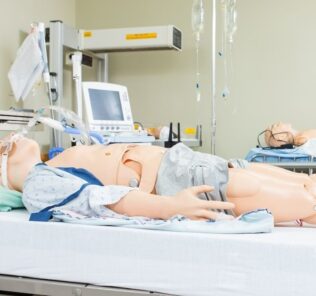Self Debriefing Before Group Debriefing Increases Learner Outcomes
Debriefing is an important element of clinical simulation, in that this practice calls for the assessment of learner performance, either as an individual or as a group. However, a recent research study has shown that, even when completed in a group setting, healthcare simulation debriefing is more effective in terms of learner outcomes when that individual is able to self-debrief before doing so as a group. To come to this conclusion, several simulation champions conducted focus group research methodology using a convenience sample of 24 fourth-year baccalaureate nursing students from three institutions.
Researchers leading “Exploring Self-Debriefing Plus Group Debriefing: A Focus Group Study” (1) included Margaret Verkuyl, MN, NP:PHC; Sara Richie, MN, RN; Daniela Cahuas, EdD, GNC(c) RN; Catherine Rowland, MHScN, RN; Merveille Ndondo, MN, RN; Theresa Larcina, MN, RN; and Kimberley Mack, MSN, RN; all of the School of Community and Health Studies at Centennial College in Toronto, Canada. Ultimately, their study explored learners’ experiences of self-debriefing followed by a facilitated group debriefing after an in-person simulation.
The sample group was mainly female (87.5%; n = 21) ranging in age from 18 to 35 years, with the majority (75%; n = 18) between the ages of 21 to 25 years old. Using these 24 fourth-year baccalaureate nursing students, four focus groups were conducted. They used a convenience sampling technique to recruit six to 10 participants per group, and semi-structured open-ended questions were asked by the focus group facilitators. These questions included:
Sponsored Content:
- Tell me about your experience in terms of your written self debriefing after the in-person simulation.
- Did the written self debriefing facilitate your reflection? If so, tell me how.
- In what ways did the written self debriefing affect your knowledge about the content or yourself?
- Compare the two types of debriefing: group debriefing alone, and self-debriefing followed by a group debriefing. What were the differences for you?
- Which debriefing process do you prefer? Why?
- Before we close, is there anything else that you would like to share about your debriefing experience?
Once the researchers obtained their responses, the authors next individually read the transcripts to familiarize themselves with the data. Then they started generating codes. Once this step was completed, the researchers met. One person read the transcripts aloud, and the group completed line-by-line coding together.
Once the codes were identified, the group categorized the codes and identified themes, keeping the research question in mind during this process. The identification of codes and themes arose from group consensus through an iterative and reflexive process.
The researchers’ conclusion from this study was that debriefing guidelines and recommendations for in-person simulation experiences are continuing to evolve based on research evidence. Furthermore, their study provides support for an immediate self debriefing, plus a facilitated group debriefing after an in-person simulation.
This proved vital to optimizing reflection, increasing the authenticity of learners’ self-reflection, and enhancing the group discussion. According to the study leaders, further research will help to determine the impact of self-debriefing on students’ comfort in the group-debrief.
Sponsored Content:
Adding to these conclusions, a separate study, “Adding Self-Debrief to an In-Person Simulation: A Mixed-Methods Study,” also found that open-ended survey responses suggest that the self-debriefing component adds value to the group debrief (2). These researchers conducted a sequential, mixed-method study to examine the outcomes of self-debriefing before a group debriefing after an in-person simulation as well.
Participants were randomly assigned by clinical simulation groups to one of two groups: group-debriefing only, or self-debriefing plus group-debriefing. Two outcomes, knowledge test scores and the debriefing experience, were measured. Out of the 388 students that participated in this study, both groups made similar knowledge gains and had similar Debriefing Experience Scores.
However, open-ended survey responses suggest that the self-debriefing component adds value to the group debriefing. Conclusion: The self-debriefing may provide some benefits to students’ personal analysis of the simulation and help them to collect their thoughts before engaging in a group debriefing. More research is needed to explore students’ experiences in engaging in a self debriefing plus a group debriefing.
“Exploring Self Debriefing and Group Debriefing in Clinical Simulation”
Presented by Merveille Ndondo, BScN, RN, MN, this HealthySimulation.com one-hour beginner webinar explores adding self-debriefing to a facilitated group debriefing to enhance learner experience. There are many standardized debriefing methods in simulation. In an academic setting, simulation is usually run for novice learners. They come with little to no experience in their field of study, and participate in simulation with knowledge gained from lectures and practice labs.
Adding a self debriefing to a facilitated group debriefing was found to enhance students’ simulation experience. A mixed-method study was done on fourth-year baccalaureate nursing students, and the results will be shared in this presentation. Four themes will be discussed: psychological safety, learning, methodology and reflection. Learning outcomes of this webinar include:
- Analyzing how self-debriefing enhances self-awareness and reflection.
- Examining how psychological safety can be enhanced with self-debriefing prior to group-debriefing.
- Discussing how the use of combining debriefing formats can optimize learning after simulation.
More About the Presenter: Merveille Ndondo is a registered nurse with a Master’s degree in Nursing. She works as a Simulation Coordinator at Ryerson University in the Nursing program. In her role, she supports student success, advancing innovation in teaching and research that drives positive change. She also has experience in critical care nursing, with 10 years of experience in the Intensive Care Unit. Additional presenters of this webinar include Raquel Lashley-Trambulo, BScN, RN.
Watch this HealthySimulation.com Webinar
Disclosures: Presentation research developed with multiple faculty and staff from one nursing collaborative program, involving three schools.
References:
- Verkuyl, M., Richie, S., Cahuas, D., Rowland, C., Ndondo, M., Larcina, T., & Mack, K. (2020, -). Exploring self-debriefing plus group-debriefing: A focus group study. Clinical Simulation in Nursing, Vol(X), 1-7.
- Verkuyl, M., Atack, L., Larcina, T., Mack, K., Cahuas, D., Rowland, C., Richie, S., & Ndondo, M. (2020, October). Adding self-debrief to an in-person simulation: A mixed-methods study. Clinical Simulation in Nursing, 47(C), 32-39. https://doi.org/10.1016/j.ecns.2020.07.003.
Lance Baily, BA, EMT-B, is the Founder / CEO of HealthySimulation.com, which he started in 2010 while serving as the Director of the Nevada System of Higher Education’s Clinical Simulation Center of Las Vegas. Lance also founded SimGHOSTS.org, the world’s only non-profit organization dedicated to supporting professionals operating healthcare simulation technologies. His co-edited Book: “Comprehensive Healthcare Simulation: Operations, Technology, and Innovative Practice” is cited as a key source for professional certification in the industry. Lance’s background also includes serving as a Simulation Technology Specialist for the LA Community College District, EMS fire fighting, Hollywood movie production, rescue diving, and global travel. He and his wife live with their two brilliant daughters and one crazy dachshund in Las Vegas, Nevada.
Sponsored Content:


















